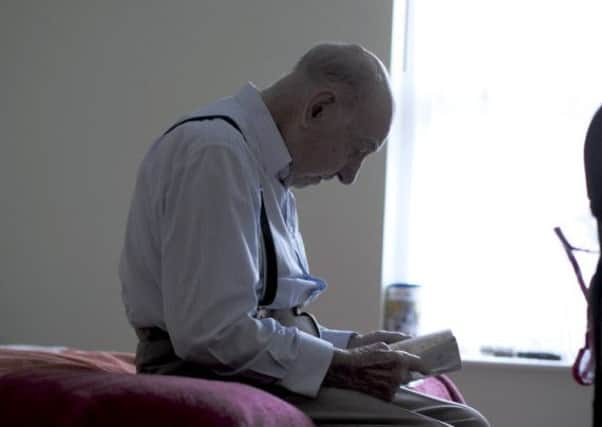Jayne Dowle: Face to face with horrors of dementia


I KNOW a man in his seventies with three sons. In his day, this man was the heart-throb of the village. He was handsome, a good worker, talented at sport, especially cricket. Now he has no chance of even following England’s progress in the Ashes. Instead, he follows his sons as if he is the child and they are the parent.
I saw some pictures of him the other week on Facebook. His sons had taken him out for a drink, for his birthday I think it was. They are smiling bravely, but he is staring into the middle distance, his face impossible to read. Who knows what is going on in his mind? It is touching to watch, but at the same time it is heart-breaking to see these big strapping lads looking after their frail father with such tenderness and care.
Advertisement
Hide AdAdvertisement
Hide AdThis man has dementia you see. It started creeping up on him a few years ago. I think at first everybody thought that dad was just getting a bit forgetful. Such is the cruelty of this degenerative illness – whether it is classified as dementia or as Alzheimer’s – that at first, individuals and their loved ones don’t even realise it has taken hold.
In so many cases though, once dementia has its claws in its progression gets faster and faster, taking with it the person who once existed and turning them into what? A mumbling presence in the corner? An embarrassment to the family? Don’t think I am being mean. I’ve seen it happen, because I used to visit my own grandmother in a care home. I witnessed those hollow-eyed old ladies calling out the names of their sons and daughters, who never came, and paid the care home bills grudgingly out of their “inheritance”.
Although grandma lived until her eighties, she ended up with a plethora of health problems which included dementia. It was soul-destroying to see the take-no-prisoners matriarch of my childhood gradually shrink into a confused and frightened little old lady. When I think about her, I wonder what the future holds. Will mum go the same way? Will I? If it’s in the family, you have to chase those thoughts away. If we dwelt on the possibilities we would never be able to live in the moment.
However, it is not selfishness or self-preservation which makes me support this newspaper’s unfailing dedication to supporting the rights of dementia sufferers and their families. It is a determination to lend my voice to the growing campaign to make the Government and the NHS realise that there are already 850,000 people in the UK suffering from dementia. This includes around 70,000 people living with the condition in Yorkshire alone.
Advertisement
Hide AdAdvertisement
Hide AdBy 2020, there will be more than one million people with the condition in the country. This isn’t a rare condition, a strange unknown genetic quirk which is likely to happen to somebody else. It is a life-changing illness which could happen to anyone in your family. It could happen to you, and earlier than you think. Early-onset dementia, which typically starts in a person’s fifties, is on the rise, partly because of improved methods of diagnosis.
You might ask though, what can we do about it? There are so many demands on public budgets, is it any wonder that funding for dementia care ranks pretty low on the priority list? Elderly people or premature babies? Where would your priorities lie if you held the purse-strings?
Well, let’s be positive. For a start, we can be pleased that GPs are shouting up for more support for families. These frontline medical staff are more often than not the first port of call when a family begins to suspect that something is wrong with grandma. In a recent poll for the Alzheimer’s Society, almost three-quarters of family doctors said that they felt that families, carers and dementia patients themselves are left confused by the health and social care system.
How can such a situation be sustainable in a society which ironically, thanks to advances in medical care, is seeing its citizens live ever-longer lives? Imagine it. The diagnosis is shock enough. What happens next though, when the person who is suffering goes home? How do they know where to turn? What can their worried relatives, especially their spouses who have to watch them deteriorate every day, expect? In many cases, what they get is violence and abuse, following by heart-rending retribution.
Advertisement
Hide AdAdvertisement
Hide AdFor every family like the one I have mentioned above, there will be scores in which no-one knows what to do. Worse, there will be families which simply can’t find it in themselves to care about their ailing and elderly relative. This has to stop. We can talk quite openly about once-taboo conditions such as cancer. Let’s do the same for this.
It is time we stopped assuming that dementia can be brushed under the carpet and accepted as some kind of inevitable consequence of the ageing process. Don’t assume it is someone else’s problem. Before you even know it, it could be yours.